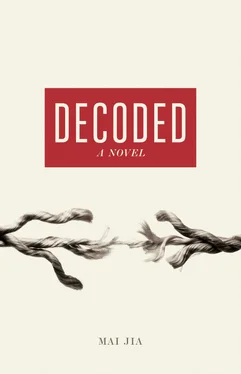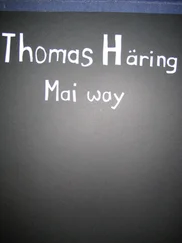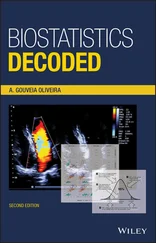Mai Jia - Decoded
Здесь есть возможность читать онлайн «Mai Jia - Decoded» весь текст электронной книги совершенно бесплатно (целиком полную версию без сокращений). В некоторых случаях можно слушать аудио, скачать через торрент в формате fb2 и присутствует краткое содержание. Год выпуска: 2014, Издательство: Allen Lane, Жанр: Современная проза, на английском языке. Описание произведения, (предисловие) а так же отзывы посетителей доступны на портале библиотеки ЛибКат.
- Название:Decoded
- Автор:
- Издательство:Allen Lane
- Жанр:
- Год:2014
- ISBN:нет данных
- Рейтинг книги:3 / 5. Голосов: 1
-
Избранное:Добавить в избранное
- Отзывы:
-
Ваша оценка:
- 60
- 1
- 2
- 3
- 4
- 5
Decoded: краткое содержание, описание и аннотация
Предлагаем к чтению аннотацию, описание, краткое содержание или предисловие (зависит от того, что написал сам автор книги «Decoded»). Если вы не нашли необходимую информацию о книге — напишите в комментариях, мы постараемся отыскать её.
Decoded — читать онлайн бесплатно полную книгу (весь текст) целиком
Ниже представлен текст книги, разбитый по страницам. Система сохранения места последней прочитанной страницы, позволяет с удобством читать онлайн бесплатно книгу «Decoded», без необходимости каждый раз заново искать на чём Вы остановились. Поставьте закладку, и сможете в любой момент перейти на страницу, на которой закончили чтение.
Интервал:
Закладка:
Shortly after his father-in-law was released from prison, Liseiwicz and his entire family departed for X country.
[To be continued]
When Liseiwicz left the country, Jinzhen was still hospitalized, though it seemed that he was now out of danger. The hospital, concerned about the mounting medical bills, accepted the patient’s request to be transferred to his home to recover. The day that he left hospital, Master Rong and her mother went to collect him. The doctor who was waiting to meet them naturally mistook one of them for the patient’s mother. However, judging by their ages, one was a bit old and the other a bit too young, so he had to ask a rather bold question: ‘Which of you is the patient’s mother?’
Master Rong was just about to explain, but her mother had already answered loud and clear: ‘Me!’
The doctor explained to Mrs Rong that Jinzhen’s illness was now under control and his condition was stable, but he would require more than a year of special treatment to make a full recovery. ‘During the course of the next twelve months, you are going to have to look after him like a baby, or he might well still suffer a relapse.’
When the doctor took her through the detailed list of what she would have to do, Mrs Rong realized that his comparison was entirely justified. There were however three key points to the treatment:
1. His food would be subject to extremely severe restrictions.
2. During the night he would have to be woken up at set intervals to empty his bladder.
3. Every day he would have to be given his medication, which would include injections, at certain set times.
Mrs Rong put on her spectacles and made notes of everything the doctor said; then she checked through them and asked questions to make sure that she had entirely understood every point. When she got back home, she asked her daughter to bring a blackboard and some chalk from the university and wrote out everything that the doctor had said. She then placed the blackboard in the stairwell so that she would see it every time she went up or down the stairs during the day. Since she had to get up regularly during the night to wake up Jinzhen to empty his bladder, she and Young Lillie started sleeping in separate bedrooms. She had two alarm clocks placed by the head of the bed, one set to ring just after midnight, the other in the early hours of the morning. After the early morning call to empty his bladder, Jinzhen would go back to sleep, but Mrs Rong would remain up so that she could prepare the first of the five meals that he had to eat during the course of the day. Although she was a fine cook, this was now by far the most difficult and time-consuming thing that she had to do. By comparison, having spent a lifetime punching holes in thick layers of felt to make cloth shoes, giving an injection was not a particularly difficult thing to learn to do — it was just the first couple of days that she was nervous and hesitant. But when it came to making food, how to prevent it from becoming tasteless and bland was a constant source of worry. The basic principle was simple: at that time Jinzhen was abnormally sensitive to salt and yet his life depended upon it: give him too much and he would suffer a relapse; give him too little and he would take much longer to recover than was strictly necessary. The doctor’s instructions on this point were extremely precise: during the patient’s period of convalescence, he would start by being allowed merely micrograms of salt, but that as time went by the amount could be gradually increased.
Of course, if a person’s daily intake of salt could be measured in grams or ounces, this is not a particularly difficult problem to solve — you just buy a good pair of scales. The problem the Rong family was faced with was not nearly so easy to solve because Mrs Rong found it impossible to lay hands on an accurate enough set of scales, so to begin with she just had to use her own careful and patient judgement. Later on Mrs Rong took a whole load of different dishes into the hospital and got the doctors to pronounce on whether they were suitable. She had already made a note of how much salt she had put in each one — having counted every single grain — and once the doctors had decided which ones were suitably unsalty, five times a day she would put on her spectacles and dole out the white and glossy grains of salt, counting them one by one as if they were the pills that would save Jinzhen’s life.
She was enormously careful when she put salt in his food. She put the salt in as if conducting a scientific experiment. Thus as one day followed another, as one night followed another, as one month followed another, her diligence and patience were as tested as if she had indeed been looking after a baby. Sometimes, in a moment of rest between bouts of this exhausting labour, she would take out the letter that Jinzhen had written in his own blood and look at it — it had been Jinzhen’s secret but having discovered it by accident, she kept it without being entirely sure why. Now, every time that she looked at this slip of paper, she was even more sure that everything that she was doing was worth it: it encouraged her to go back to work with redoubled energy. More than anything else, it was this that dragged Jinzhen from the brink of the grave.The following spring, Jinzhen was back in the classroom.
10
Liseiwicz was gone, but part of him had remained behind.
While Jinzhen was being coddled like a newborn baby, Liseiwicz was in contact with Young Lillie on three occasions. The first was not long after he arrived in X country: he sent a picture postcard with a beautiful landscape — on the back there was a simple greeting and a return address. It was his home address so there was no way of knowing where he was working. The second communication arrived not long after the first. It was a letter in response to Young Lillie’s reply. He said that he was very happy to know that Jinzhen was better. He gave a vague reply concerning Young Lillie’s questions about his work; he said that he was working in a research institute but said nothing about which one or what he was doing there — it was almost as if he wasn’t allowed to tell us about it. The third letter addressed to Young Lillie arrived just before Chinese New Year — Liseiwicz wrote it on Christmas Eve. The stamp on the envelope showed a Christmas tree. In his letter, Liseiwicz mentioned that he had recently received amazing news from a friend: Princeton University had amalgamated several independent research units to create an institute dedicated to the issue of artificial intelligence — their work would be directed by the famous mathematician Paul Samuelson. He wrote: ‘This means that it is not just me that has realized the value and importance of this field of research. . As far as I am aware, this is the first group working on this subject anywhere in the world.’
Supposing that Jinzhen was really better (and in fact he had pretty much recovered completely by this time), he was hoping that he too would start work on the field. He made it clear that if Jinzhen could not carry out research into artificial intelligence in China, he thought he should leave and find somewhere better to work. He told Young Lillie that he should not let short-term benefits or problems prevent Jinzhen from achieving the great things of which he was capable. Perhaps it was because he was afraid that Young Lillie would insist on making Jinzhen stay with him and work on this problem that he even lugged a Chinese proverb into his argument: ‘A fine sword should not be used for chopping firewood.’
‘Anyway,’ he wrote, ‘the reason why I insisted that Jinzhen should study in America in the past, the reason why I want him to do so now, is because here he has the facilities to support his work — if he comes here, he will find everything much easier.’He concluded with the following paragraph:
Читать дальшеИнтервал:
Закладка:
Похожие книги на «Decoded»
Представляем Вашему вниманию похожие книги на «Decoded» списком для выбора. Мы отобрали схожую по названию и смыслу литературу в надежде предоставить читателям больше вариантов отыскать новые, интересные, ещё непрочитанные произведения.
Обсуждение, отзывы о книге «Decoded» и просто собственные мнения читателей. Оставьте ваши комментарии, напишите, что Вы думаете о произведении, его смысле или главных героях. Укажите что конкретно понравилось, а что нет, и почему Вы так считаете.












